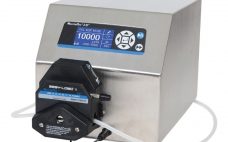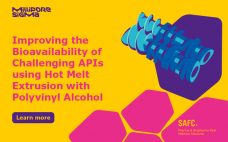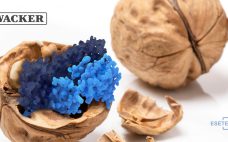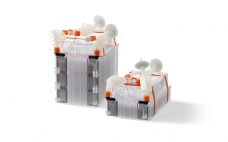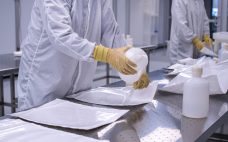This webcast features: Andeka Ocio Velasco, Manufacturing & Process Validation Technician, Progenika Biopharma, a Grifols company; and Robert Martindale, Product Sales Manager, Masterflex EMEA, Antylia Scientific The final filling mistakes within bioprocessing are far too expensive to be allowed or tolerated. Continuous optimization is a commitment that all companies need to embrace to increase business profitability potential. Evaluating and utilizing new technologies will enable a faster methodology of process, increase the scaling up of bioprocesses, and increase the accuracy of…
Author Archives: BPI Contributor
Improving the Bioavailability of Challenging APIs using Hot Melt Extrusion with Polyvinyl Alcohol
New molecular entities (NMEs) are becoming larger, more crystalline and more lipophilic and, as a result, less soluble. While approximately 40% of active pharmaceutical ingredients (APIs) currently on the market show poor solubility, it is estimated that between 60 and 90% of compounds in development have solubility challenges.1,2 For an oral formulation, API solubility and permeability are critical factors for absorption in the gastrointestinal tract. As a result of this, solubility-enhancing formulation techniques have become an area of focus for…
Evaluating Current Manufacturing Platforms for Viral Vector Production to Enable Gene Therapy Products
The rapidly growing interest in gene therapy has led to the need for more cost-effective and scalable viral vector manufacturing platforms to deliver these therapies. Adeno-associated virus (AAV) has become the vector of choice as it stands out for its safety profile since infection with the vector is not pathogenic. Also, AAV cannot replicate on its own and is not directly integrated into the host genome. Realizing the full potential of viral vector-based therapies requires a successful manufacturing platform for…
What Technologies Should You Apply to Your Vaccine-Specific Process?
Vaccines have been protecting against disease since the late 1700s. They function by triggering the immune system to generate short-term and long-term responses. Because there are many pathogens, there are also many vaccines. They can be classified by antigen character, but the manufacturing flows used to produce them are relatively similar. Read now our Vaccine Bioprocessing Handbook to learn more on similarities and differences on Vaccine processes for: viral vaccines, Virus-Like Particle (VLP) Vaccines, Polysaccharide Conjugated Vaccines, Viral Vector Vaccines…
Ask the Expert: Selecting the Right Buffer Management Strategy
Although buffers are among the simplest materials used in bioprocessing, they are critical to biopharmaceutical manufacturing success. Buffer preparation, storage, and handling can require significant investments in time, labor, equipment, and facility space. Jenny Dunker, MSc, and Alexander Troken, PhD (global product managers for customized bioprocess solutions and for process liquids and buffers, respectively, at Cytiva), delivered an “Ask the Expert” presentation on 30 March 2021 to explore strategies for intensifying buffer management. Available Options Biopharmaceutical manufacturers often prepare buffers…
Ask the Expert: Considerations for Mass Spectrometric HCP Analysis During Process Development
Host-cell proteins (HCPs) must be assessed early in biopharmaceutical product development to establish the efficiency of a purification process. Liquid chromatography coupled with mass spectrometry (LC-MS) is a strong orthogonal method for HCP identification and quantitation. During an 18 March 2021 “Ask the Expert” presentation, Christina Morris (senior scientist at BioPharmaSpec) explained how MS analyses can enhance process development (PD), then presented considerations for generating spectral libraries, selecting samples for quantitation, and reviewing data. Morris’s Presentation Spectral Libraries: A typical…
Mixed-Mode Chromatography: Optimizing Target Purity and Recovery with Buffer Additives
This webcast features: Xuemei He, PhD, R&D Manager of Chromatography Media Chemistry, Bio-Rad Laboratories New biotherapeutic constructs continue to increase in biopharmaceutical development, extending treatment options to a broad range of diseases we face today. These biopharmaceuticals include recombinant proteins, monoclonal antibodies, antibody drug conjugates, bispecifics, viruses, and virus-like particles to mention a few. A simple, straightforward approach to the production of these biomolecules is required to meet the current demand for process efficiency and economics. Innovative chromatographic methods facilitate…
Inducible Secretion with ESETEC: The Solution for Difficult-to-Produce Proteins
This webcast features: Dr. Marcel Thoen, Head of Global Competence Center for Cell Line Development, Wacker Biotech Escherichia coli is the most popular expression system for all nonglycosylated biopharmaceuticals. However, common challenges include purification of expressed proteins recovered from the periplasm or those needing refolding from inclusion bodies. These constraints have been addressed by the unique secretion E. coli expression system ESETEC (E. coli secretion technology) developed by Wacker Biotech. Through years of experience, Wacker Biotech has observed that secretion…
Tools for Simplifying MSC Expansion, Cryopreservation, and DMSO Removal
This webcast features: Hilary Sherman, Senior Scientist, Corning Life Sciences Mesenchymal stem cells (MSCs) are one of the most frequently utilized cell types for cell therapy applications due to their ability to be isolated from several sources and easy adaptability to culture conditions. Bone marrow derived MSCs in particular are commonly studied due to their ease of access and achievable therapeutic dosage. While expanding MSCs to achieve these quantities, there is a risk for heterogeneity-induced quality failures during the manufacturing…
The Unique Benefits of Presterilized Fluoropolymer Bottles: Case Studies in Vaccine Delivery Applications
This webcast features: Eric Isberg, Vice President, Life Sciences, Savillex Fluoropolymers are the ultimate materials for use in bioprocess applications, providing increased purity, compatibility, inertness, and security for process fluids and bulk product. Bottles and vials manufactured from fluoropolymers have the added benefits of having virtually no leachables and extractables, a very wide service temperature range including performance down to liquid nitrogen temperatures, and unmatched durability, including being essentially unbreakable during use. This presentation will highlight the benefits of presterilized…

